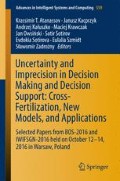Abstract
The Neural networks are a tool that can be used for the modelling of many systems and process behavior. Quality of life has been receiving significant attention in health care systems over the past years. In public health research the ‘quality of life’ concept is often analyzed in the frame of ‘health-related quality of life’. The artificial neural networks can “understand” the information from the health care processes. For the estimations between these two concepts we use intuitionistic fuzzy set.
Access this chapter
Tax calculation will be finalised at checkout
Purchases are for personal use only
References
Atanassov, K.: Intuitionistic Fuzzy Sets. Springer, Heidelberg (1999)
Bishop, C.M.: Neural Networks for Pattern Recognition. Oxford University Press, Oxfored (2000). ISBN 0 19 853864 2
Brazier, J.J.N., Kind, P.: Testing the validity of the EuroQol and comparing it with the SF-36 health survey questionnaire. Qual. Life Res. 2, 69–180 (1993)
Essink-Bot, M.-L., Krabbe, P., Bonsel, G., Aaronson, N.: An empirical comparison of four generic health status measures: the Nottingham health profile, the medical outcomes study 36-item short-formhealth survey, the COOP/WONCA charts, and the EuroQoL Instrument. Med. Care 35, 522–537 (1997)
Hagan, M.T., Demuth, H.B., Beale, M.: Neural Network Design. PWS Publishing Company, Boston (1996)
Haykin, S.: Neural Networks: A Comprehensive Foundation. Prentice Hall, N.J. (1999)
Hays, R.D.: Thoughts on assorted issues in health-related quality of life assessment in workshop report: to develop a research agenda and research resources for health status assessment and summary health measures, March 2003
Idler, E.L., Benyamini, Y.: Self-rated health and mortality: a review of twenty- seven community studies. J. Health Soc. Behav. 38, 21–37 (1997)
Janssen, M.F., Szende, A., Cabases, J.: Population Norms for the EQ-5D-3L: a Cross-Country Analysis of Population Surveys for 20 Countries, National and Regional EQ-5D Population Surveys Papers. EuroQol Plenary Session, Rotterdam (2012)
Patrick, D.L., Bergner, M.: Measurement of health status in the 1990s. Annu. Rev. Publ. Health 11, 165–183 (1990)
Rumelhart, D.E., Hinton, G.E., Williams, R.J.: Learning representations by back-propagating errors. Nature 323, 533–536 (1986)
Van Agt, H., Essink-Bot, M.-L., Krabbe, P., Bonsel, G.: Test-retest reliability of health state valuations collected with the EuroQoL questionnaire. Soc. Sci. Med. 39, 1537–1544 (1994)
Vankova, D., Kerekovska, A., Kostadinova, T., Usheva, N.: Health-related quality of life in the community. In: Assessing the Socio-Economic, Demographic and Behavioural Impact on Health-Related Quality of Life at a Community Level: Evidence from Bulgaria, Proceedings Database (2013). http://www.euroqol.org/uploads/media/EQ12-P05.pdf
Vankova, D.: Community-centered research in Bulgaria, a mixed-methods approach to health-related quality of life. In: 8th European Public Health Conference, Proceedings, European Journal of Public Health 25(suppl 3), p. 291, 6 October 2015. http://dx.doi.org/10.1093/eurpub/ckv175.046ckv175.046
Vankova, D., Sotirova, E., Bureva, V.: An application of the InterCriteria analysis approach to health-related quality of life. In: 11th International Workshop on IFSs, Banská Bystrica, Slovakia, Notes on Intuitionistic Fuzzy Sets, ISSN 1310–4926, vol. 21, no. 5, pp. 40–48, 30 October 2015
Vankova, D., Kerekovska, A., Kostadinova, T., Todorova, L.: Researching health-related quality of life at a community level: survey results from Burgas, Bulgaria. Health Promot. Int. 2015, 1–8 (2015). doi:10.1093/heapro/dav016
Yu, H., Wilamowski, B.M.: Levenberg-Marquardt training. In: The Industrial Electronics Handbook, vol. 5, pp. 1–15 (2011)
Author information
Authors and Affiliations
Corresponding author
Editor information
Editors and Affiliations
Rights and permissions
Copyright information
© 2018 Springer International Publishing AG
About this paper
Cite this paper
Vankova, D., Sotirov, S., Doukovska, L. (2018). An Application of Neural Network to Health-Related Quality of Life Process with Intuitionistic Fuzzy Estimation. In: Atanassov, K., et al. Uncertainty and Imprecision in Decision Making and Decision Support: Cross-Fertilization, New Models and Applications. IWIFSGN 2016. Advances in Intelligent Systems and Computing, vol 559. Springer, Cham. https://doi.org/10.1007/978-3-319-65545-1_17
Download citation
DOI: https://doi.org/10.1007/978-3-319-65545-1_17
Published:
Publisher Name: Springer, Cham
Print ISBN: 978-3-319-65544-4
Online ISBN: 978-3-319-65545-1
eBook Packages: EngineeringEngineering (R0)

